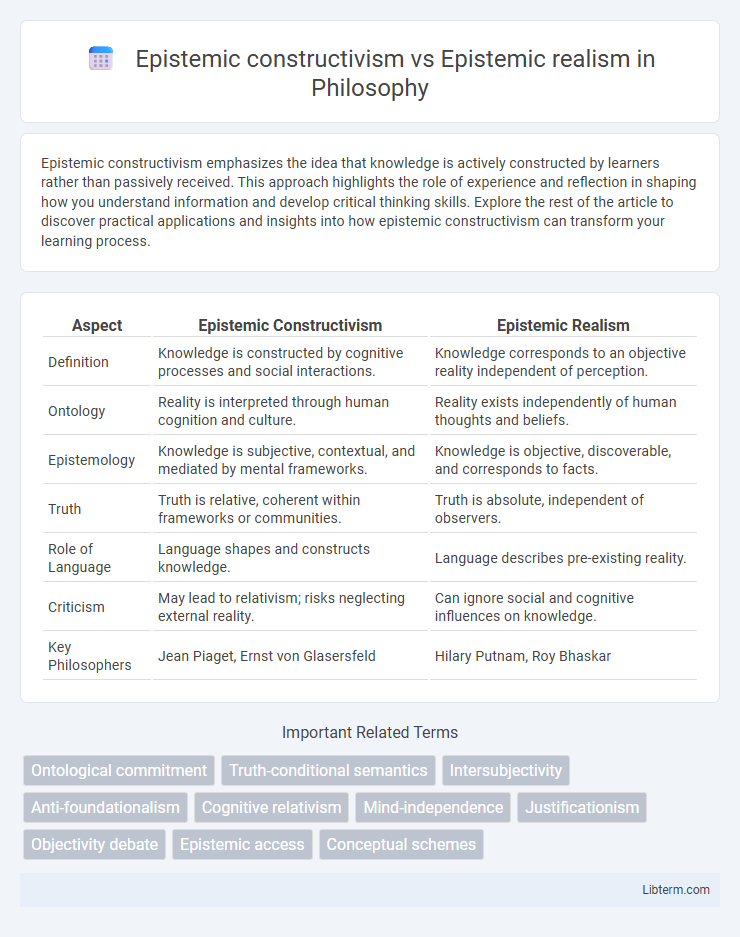Epistemic constructivism emphasizes the idea that knowledge is actively constructed by learners rather than passively received. This approach highlights the role of experience and reflection in shaping how you understand information and develop critical thinking skills. Explore the rest of the article to discover practical applications and insights into how epistemic constructivism can transform your learning process.
Table of Comparison
| Aspect | Epistemic Constructivism | Epistemic Realism |
|---|---|---|
| Definition | Knowledge is constructed by cognitive processes and social interactions. | Knowledge corresponds to an objective reality independent of perception. |
| Ontology | Reality is interpreted through human cognition and culture. | Reality exists independently of human thoughts and beliefs. |
| Epistemology | Knowledge is subjective, contextual, and mediated by mental frameworks. | Knowledge is objective, discoverable, and corresponds to facts. |
| Truth | Truth is relative, coherent within frameworks or communities. | Truth is absolute, independent of observers. |
| Role of Language | Language shapes and constructs knowledge. | Language describes pre-existing reality. |
| Criticism | May lead to relativism; risks neglecting external reality. | Can ignore social and cognitive influences on knowledge. |
| Key Philosophers | Jean Piaget, Ernst von Glasersfeld | Hilary Putnam, Roy Bhaskar |
Introduction to Epistemic Constructivism and Epistemic Realism
Epistemic constructivism asserts that knowledge is actively constructed by individuals through their experiences and cognitive processes, emphasizing subjective interpretation and social context. Epistemic realism, in contrast, maintains that knowledge corresponds to an objective reality independent of human cognition, highlighting an external world that can be discovered and understood. These two epistemological positions fundamentally differ in their views of truth, with constructivism focusing on the processes of knowing and realism stressing the existence of an independent, knowable reality.
Defining Epistemic Constructivism
Epistemic constructivism posits that knowledge is actively constructed by individuals through cognitive processes and social interactions rather than discovered as an objective reality. This theory emphasizes the role of context, culture, and experience in shaping understanding, contrasting sharply with epistemic realism, which asserts that knowledge corresponds directly to an independent, mind-independent reality. Epistemic constructivism highlights the dynamic, interpretive nature of knowledge formation, stressing that what is known is contingent on human perception and conceptual frameworks.
Defining Epistemic Realism
Epistemic Realism asserts that knowledge corresponds to an objective reality independent of human perception or cognition, emphasizing the existence of truth as an external fact. It posits that beliefs and theories are true or false based on their accurate representation of the external world. This contrasts with Epistemic Constructivism, which views knowledge as a human-constructed framework shaped by social, cultural, and cognitive factors rather than a direct mirror of reality.
Core Principles and Philosophical Foundations
Epistemic constructivism posits that knowledge is actively constructed by cognitive processes influenced by social, cultural, and historical contexts, emphasizing the subjective nature of understanding. Epistemic realism asserts that knowledge corresponds to an objective reality independent of individual beliefs, highlighting an external, mind-independent truth. Core principles of epistemic constructivism include interpretivism and the rejection of absolute objectivity, whereas epistemic realism is grounded in correspondence theory and the pursuit of objective verification.
Key Differences between Constructivism and Realism
Epistemic constructivism emphasizes knowledge as a product of human cognition and social processes, asserting that understanding is constructed rather than discovered. In contrast, epistemic realism holds that knowledge corresponds to an objective reality independent of human perception or beliefs. Key differences include the constructivist view of knowledge as context-dependent and interpretive versus the realist position advocating for an observer-independent truth.
Historical Background and Influential Thinkers
Epistemic constructivism emerged prominently in the 20th century with thinkers like Jean Piaget and Ernst von Glasersfeld, emphasizing knowledge as a human construction shaped by cognitive processes and social interactions. In contrast, epistemic realism traces its roots to classical philosophy, with key figures such as Aristotle and Rene Descartes asserting that knowledge corresponds to an objective reality independent of human perception. The historical debate between these perspectives centers on whether knowledge discovers external truths or constructs meaning within the mind, profoundly influencing contemporary epistemology and scientific methodology.
Implications for Knowledge and Truth
Epistemic constructivism posits that knowledge is actively constructed by individuals or communities, implying that truth is contingent on social, cultural, or cognitive frameworks, which challenges the notion of absolute or objective truth. Epistemic realism asserts that knowledge corresponds directly to an external reality independent of human perception, maintaining that truth exists objectively regardless of individual beliefs or social contexts. The implications for knowledge highlight a fundamental divide: constructivism emphasizes interpretive processes and contextual validation, while realism stresses discovery and adherence to empirical evidence as pathways to truth.
Debates in Contemporary Epistemology
Epistemic constructivism posits that knowledge is actively constructed by cognitive agents, emphasizing the role of social, historical, and cultural contexts in shaping epistemic justification. In contrast, epistemic realism maintains that knowledge corresponds to objective truths independent of human perspectives or conceptual schemes. Contemporary epistemological debates surrounding these positions focus on the nature of truth, the objectivity of justification, and the implications for scientific knowledge and inquiry frameworks.
Critiques and Counterarguments
Epistemic constructivism faces critiques for its relativistic implications, suggesting knowledge is subjective and contingent on social constructs, which critics argue undermines objective truth. Epistemic realism counters by asserting that knowledge corresponds to an independent reality, but is challenged for overlooking the influence of cognitive frameworks and cultural contexts on knowledge acquisition. Both perspectives demand nuanced consideration of how truth, certainty, and context interact in epistemology.
Conclusion: Comparative Evaluation
Epistemic constructivism asserts that knowledge is actively constructed by the knower through social and cognitive processes, emphasizing the subjective nature of understanding. Epistemic realism maintains that knowledge corresponds to an objective reality independent of human cognition, prioritizing the discovery of universal truths. A comparative evaluation reveals that constructivism highlights the contextual and interpretive aspects of knowledge formation, whereas realism underscores the existence of an external reality that can be systematically known.
Epistemic constructivism Infographic

 libterm.com
libterm.com